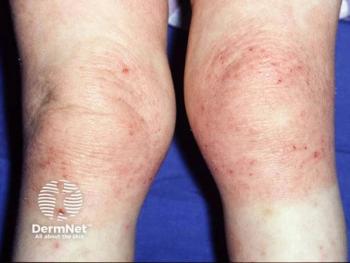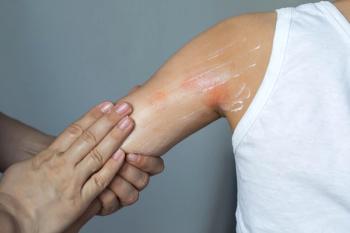
Interpretating AAD’s Atopic Dermatitis Guidelines
Michael Cameron, MD, identifies the most important pearls from the latest atopic dermatitis treatment guidelines set forth by the American Academy of Dermatology.
Episodes in this series

This news content has been independently developed and is not endorsed by the American Academy of Dermatology.
This Dermatology Times Expert Perspectives series delves into the multifaceted landscape of atopic dermatitis (AD) care and treatment. Through interviews with 4 leading dermatologists, this series explores key benchmarks, emerging trends, personalized medicine approaches, long-term safety considerations, and the integration of novel therapies in the management of AD. Each episode provides valuable insights into navigating the heterogeneity of AD presentations, selecting appropriate treatment plans tailored to individual patient needs, and incorporating the latest guidelines from the American Academy of Dermatology (AAD). From discussing the nuances of patient education and shared decision-making to addressing the intersection of comorbidities with AD management, this series equips dermatology clinicians with the knowledge and strategies necessary to optimize patient outcomes and enhance the quality of care.
In this episode, Michael Cameron, MD, dermatologist at Cameron Dermatology PLLC and assistant clinical professor at Mount Sinai in New York, New York, identifies the most important pearls from the latest atopic dermatitis treatment guidelines set forth by the AAD.
Dermatology Times Interview with Michael Cameron, MD
Dermatology Times: As a dermatologist, how do you interpret and incorporate the latest atopic dermatitis treatment guidelines released by the American Academy of Dermatology at the end of last year?
Cameron: I think it's important that we do [look at] these guidelines. But for me, it's really just a compendium of what's the level of evidence for things and what therapies are available. They're really not diving in, from my perspective, detailed in terms of what's probably the best options for patients. It's just based on the available data. For example, when they look at level of evidence, it's just 1 example. They call out crisaborole as having a higher certainty level of asthma events than ruxolitinib (Opzelura) and I found myself a bit confused by that. I mean, ruxolitinib ran pivotal phase 3 data where they had a way higher placebo delta than crisaborole did compared to placebo. In a moderate to severe population, to me, if anything it is the opposite. And so I'm really confused by that in terms of that certainty of evidence.
I just find also there's no nuance between therapies. Everything is recommended. And everything's high level of evidence. And so there's really no kind of pull this actually has on my practice, and really is just a compendium of available options. I do find the commentary regarding the level of evidence for things like skin hygiene and you know, use of soaps and bathing to be helpful. So that part is great. I think that we just are all taught in residency basic tenants of skin care and skin hygiene. But there's some disagreements between allergists and dermatologists, as well as parents and education out there about frequency of bathing, use of soaps, bleach baths, and things like that. And so it's really helpful to see kind of how much evidence each of these things has in terms of skin hygiene. And so how much can you hang our hat on this versus this is just more anecdotal. I think the biggest thing from my perspective is that the guidelines are updated to really recommend strongly both topical ruxolitinib as well as the oral JAK inhibitors, which is great and it's great news for patients. It's just another thing to kind of cement they're really important role in the management of AD patients.
Transcript edited for clarity
Newsletter
Like what you’re reading? Subscribe to Dermatology Times for weekly updates on therapies, innovations, and real-world practice tips.















